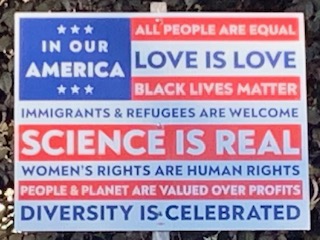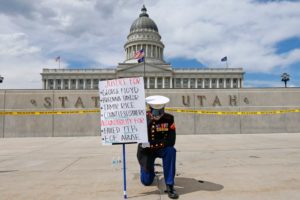Interdependence Day
By
Mike Hill
This is the time set aside to celebrate American independence. But has an Independence Day ever brought less certainty for more people? Less certainty about what an “American” is and from what are we “independent”? The “we” is usually left undefined in “we the people.” When the “we” is defined, it’s with the founding phrase “all people are equal.” This too presents a version of “allness” glaringly incomplete in scope. What can we do with this incompleteness?
American independence traditionally signals a kind of patriotic exceptionalism: we’re individuals, not aristocrats. We’re free, not bound by fixed hierarchies. We respect privacy, which means “love” should matter most to those in love and matter least to the prying eyes of the state. We support institutions fostering “real” knowledge, no matter what political or economic change good science demands. These are our ideals.
And yet, what if American individualism just meant detachment from our fellow human beings, the immigrants Americans “all” were at one time or another? What if freedom meant the freedom not to care? What if breaking from the aristocracy simply meant just replacing ancient hierarchies of castles and blood-lines with new-fangled cash dynasties locked within the gated community? What if science stopped serving the interests of “people and the planet,” and merely put more profit in pockets a wealthy few elites?
Maybe our concept of independence needs to be updated by one of mutuality and care: an American Interdependence Day. This would re-inventing “our America,” expanding our identities inward for sake of real equality, and outward in the service of the humanity at large. But in order to go large we’d have to find something we share.
What we share now is precarity: vulnerability, risk, fear, uncertainty, confusion, and rage against the forces of money and power too many Americans refuse to name. In contrast with the exceptionalism celebrated on the fourth of July, we’re simply not exempt from dangers once presumed to be out there or in the past, dangers like war, disease, racism, poverty, and climate catastrophe. Like the soldier turned religious in the heat of battle, sealed in our homes, masked in our cars, distanced in our public spaces, precariousness has made neighbors of us all.
To remark upon our lives at risk, and to suggest we turn our actions toward American interdependence, doesn’t mean we share danger in equal degrees. Most of us know, or should know, disease and violence follow poverty and racism, and upper-class white folks in the West bear a disproportionately smaller share of precariousness than a large portion of the rest of the planet (two-thirds of the world’s population live on less than 10 dollars a day).
Few people know whiteness itself is a recent historical invention, dated concurrently with the first celebrations of American independence. The way the English, Welsh, Scottish and Irish, fought their national wars and defined themselves as separate “races” before the 1700s must’ve looked to Americans after 1776 like a confusing form of white-on-white racial violence. The so-called white race was invented in the US as both a legal and cultural concept designed similarly to sort competing national groups. Italians, Irish, Poles, Germans, Jews, and other so-called white people, found themselves formed into a form of racial “allness” opposed to a different one comprised of Native Americans, Blacks, Latinx, and Asians. This had, and still has, disastrous consequences for our ability to recognize the interdependence we have with each other.
But just like whiteness is no longer the American norm, the worn-out idea that independence from each other equals safety from the dangers we all face also no longer holds. We share precarious lives. The unevenness of risk we share reminds us of the incomplete sense of “allness” in “all people are equal.” But danger spread among all requires the most and least vulnerable among us to revisit democracy in interdependent ways. There will be no “normal” on July 4, 2020. That much is sure. But why doesn’t this inspire as much hope as fear?
The political scientist, Hannah Arendt, writing in opposition to Hitler’s fascist dreams in the wake of World War II, must’ve had both hope and fear in mind when she likened “real freedom” to the arrival of a “miracle.” The resurgence of white enthno-nationalism in the US makes Arendt exactly the right person to cite. “Freedom,” she writes, is an “act [that] interrupts autonomism.” In other words, to be free is only something realizable by coming together with other people in ways creating a kind of actionable surprise. Get out of the habit of independence as freedom from care. Arendt calls the better freedom she has in mind “a new beginning that breaks into the world as an ‘infinite improbability’.” But miracles don’t mean events and acts that can’t be brought into being. “It is precisely the infinitely improbable,” she continues, “which actually constitute the very texture of everything we call real.”
The language is dense, but Arendt’s intention is clear. We can know things and act better; our individuality is only worthwhile to the extent we understand our dependence on each other; and the scale of otherness America should celebrate, must exist at a scale larger than ourselves. Arendt’s term “infinitely improbable” encourages us to find unexpected allegiances, new relational rights, and commitments to each other exceeding the narrow confines of who we’re merely expected to be. A miracle? Maybe. But if we’re celebrating anything worthwhile this fourth of July it’s the hope that unrealized possibilities of freedom will come surprisingly and at long last.


